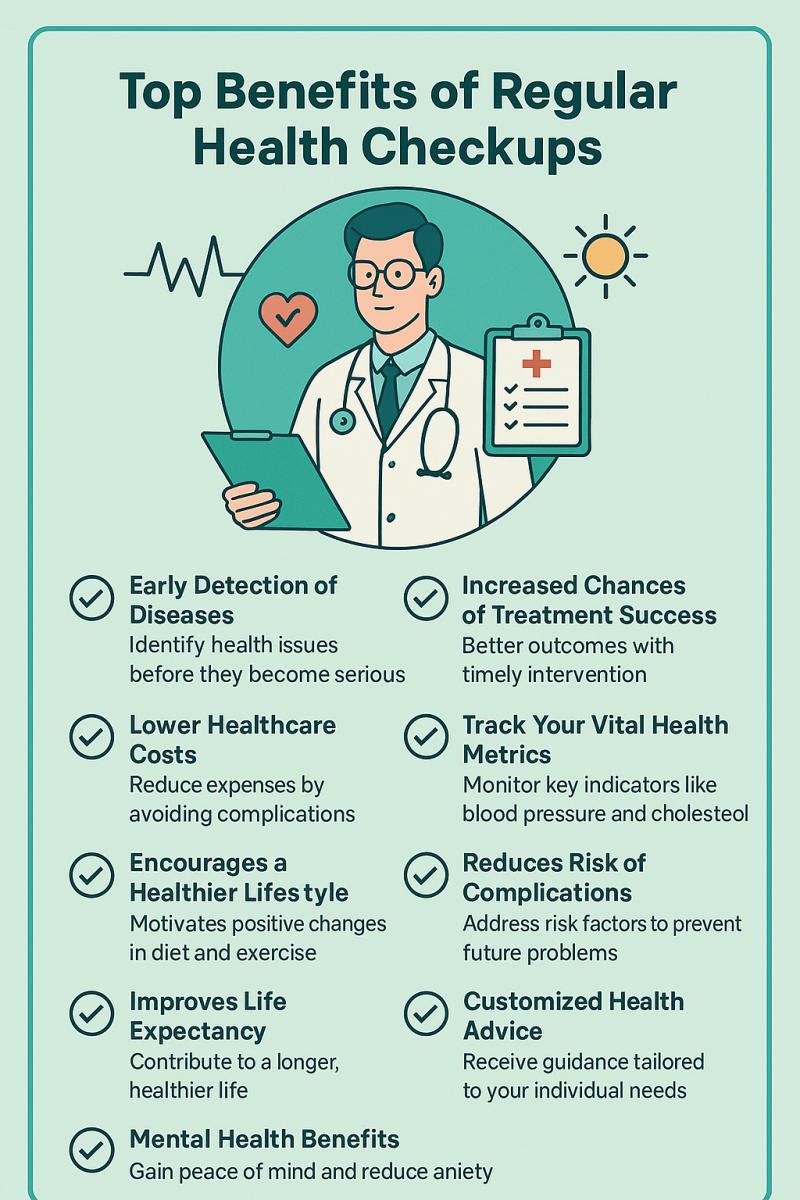Top Benefits of Regular Health Checkups: Why Prevention is Better than Cure

In today’s fast-paced world, preventive healthcare has become more crucial than ever. A regular health checkup isn't just a medical routine — it’s a proactive step towards a healthier and longer life. Whether you’re in your 20s or 60s, scheduling a health checkup can help detect potential problems early and give you peace of mind.
In this blog, we’ll explore the top benefits of regular health checkups, what tests you should consider, and how these checkups can save you time, money, and stress.
✅ What is a Health Checkup?
A health checkup or medical checkup is a series of tests conducted to assess your overall health and detect any signs of illness or disease, even if you feel perfectly fine. It usually includes:
Physical examination
Blood tests (CBC, Lipid profile, Blood sugar)
Blood pressure and heart rate monitoring
BMI and body weight evaluation
Urine and stool analysis
Specific screenings based on age, gender, and risk factors
? Top Benefits of Health Checkups
1. Early Detection of Diseases
Regular health screenings can detect issues before symptoms appear. Diseases like cancer, diabetes, and hypertension often remain silent until it's too late.
✅ Example: A routine blood sugar test can detect prediabetes, allowing you to take preventive measures early.
2. Increased Chances of Treatment Success
When diseases are caught early, they are typically easier to treat. This reduces the risk of complications and improves outcomes.
? Fact: Early-stage cancer has a much higher survival rate compared to later stages.
3. Lower Healthcare Costs
Treating a condition in its early stages is often much cheaper than dealing with severe complications. Preventive care minimizes expensive hospital stays and surgeries.
4. Track Your Vital Health Metrics
Regular checkups provide insight into key health metrics such as:
Blood Pressure
Cholesterol Levels
BMI (Body Mass Index)
Blood Sugar
Vitamin D & B12 levels
Monitoring these metrics helps you make informed lifestyle choices.
5. Encourages a Healthier Lifestyle
Getting health reports can motivate behavioral changes. If your cholesterol is borderline high, you may be inspired to eat better, exercise more, and cut down on saturated fats.
6. Reduces Risk of Complications
Early identification of risk factors means you can take preventive action before complications occur. For instance:
Lowering high BP reduces the risk of stroke.
Managing blood sugar prevents nerve and kidney damage.
7. Improves Life Expectancy
Staying on top of your health adds years to your life. Prevention and early detection directly impact longevity and quality of life.
? Data Insight: People who undergo annual checkups are 20-30% more likely to live longer, healthier lives.
8. Customized Health Advice
Doctors offer personalized advice based on your lifestyle, family history, and test results — including:
Diet plans
Exercise routines
Mental health guidance
Sleep recommendations
9. Mental Health Benefits
Knowing your health is in good condition can reduce stress and anxiety. Early diagnosis of conditions like depression or anxiety also allows timely treatment.
? Essential Tests in a Health Checkup
?⚕️ Who Should Get Regular Checkups?
Everyone should get checkups, but some groups need them more frequently:
Adults over 30
People with a family history of chronic diseases
Overweight or obese individuals
Smokers & heavy drinkers
People under high stress
Pregnant women or those planning pregnancy
? Tips for Making the Most of Your Checkup
Make a list of symptoms or concerns beforehand.
Carry previous medical records or prescriptions.
Ask questions — understand your numbers.
Follow up with tests and lifestyle changes.
Choose a trusted clinic or diagnostic center.
? How Often Should You Get a Health Checkup?
Latest Threads |

Comments